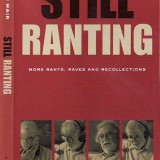I sat in my hotel room in London on a recent vacation, reading the comments on my last article in thetyee.ca in which I had congratulated the Vancouver Sun for printing an op-ed piece by Dr. Marvin Shaffer of SFU which stated the elementary truth that the government is forcing BC Hydro to pay more for private power than they can make it for themselves or sell it for. The general consensus seemed to be that I’d gone soft in the head and that we need not assume that Postmedia would suddenly be printing the truth on this subject.
I then looked at the reaction to a similar article I wrote on this website and thought – there having been no response from any of the media I had critiqued – that the critics were right that I was naïve to suppose that any of the columnists, reporters or Postmedia editors gave a damn, and that I was terminally naïve to think that the Sun or Province would publish any more op-ed pieces criticizing the Clark government on any matters which could hurt their chances in the snap election Ms Clark seems determined to call.
Thus I think, on reflection, that they are right. This is not going to happen. We will not be seeing analytic articles by Vaughn Palmer or Mike Smyth; nor, lamentably from Stephen Hume. They won’t be writing anything terribly troublesome for fish farmers even though their flacks and apologists seem to have little difficulty getting op-ed pieces and even news stories printed. I see no indication that the government bankrupting BC Hydro has caught their eye – or if it has, that they would have the editorial freedom to write about it.
Some time back I suggested that these and other writers self-censored for the simple reason that they otherwise won’t be printed. The editor of one of these papers phoned me whining that I had been unfair and asked if I really thought he told his writers what to write?
When he denied that he did this I asked why, then, they never had explored the questions I and others had raised on these matters. He replied that what they wrote about was their affair. I can’t prove what I say but only point out that most editors I have worked for and work for now have suggested a topic that seems important. Sometimes it does, sometimes it doesn’t.
I might add that when papers and radio stations didn’t like the opinions I wrote on or spoke about, I got fired – often, I might add.
Perhaps I should take that editor at his word. Could it just be that they haven’t considered the rape of the fish farms and the ruin of our rivers and the accompanying bankruptcy of BC Hydro as real issues affecting the public interest?
But I can’t do that for it would be accusing Postmedia and their writers of being stupid and I know that they aren’t. In fact, quite to the contrary they are highly intelligent and excellent writers.
I owe them one more chance to respond. Thus I then ask Mike Smyth, Vaughn Palmer and other writers why, over the past several years, they have not written about the fish farm issue? ALL the independent scientists have excoriated the industry and the issues, yet the closest Postmedia (Canwest in drag) has printed are the fish farmers’ formal flack and the utterly discredited environmental turncoat Patrick Moore.
UBC’s Dr. Daniel Pauly, one of the world’s acknowledged top marine scientists has said that the scientific debate is over on the sea lice question, yet the fish farmer flack seems to get space on demand with nary a dissenting word,
I then ask why haven’t Mr. Palmer or Mr. Smyth – or any other Postmedia columnist – examined the BC Hydro scandal? Never mind the gross environmental degradation caused by private power dams (they prefer to call them “weirs”, in their Orwellian “New Speak”) and the wreckage of clear cuts for roads and transmission lines; leave aside for a moment the fish they kill and the habitat they destroy. Simply answer this: why haven’t you written on the issue that Dr. Shaffer and other academics and economists have raised – namely that this government in Victoria has forced BC Hydro into contracts with large corporations under which each transaction hits Hydro with a huge loss?
Never mind that the entire Energy Policy is based on utter falsehoods; leave aside the Orwellian claim that private power is “clean and green” – simply address the points made by Dr. Shaffer which fortify those of his colleague Dr. John Calvert in his formidable account of the whole situation, the book Liquid Gold.
Surely any fiscal theory that you can “buy high and sell low” and still make money bears some examination. The “Fast Ferries” issue of the NDP days, which Mr. Palmer so bravely and thoroughly exposed pales into insignificance when compared to the Campbell cum Clark Energy Policy.
Erik Andersen, a highly regarded economist specializing in government financing, makes the obvious point that BC Hydro would go broke under the Liberal Policy were it not for the fact that they can pass their losses onto the poor ratepayers (that’s us folks. In fact we get it twice, once at home, then as a cost pass through from the industry whose power we subsidize more and more).
A modest request to Mr. Palmer, Mr. Smyth et al.: prove that I’m wrong to suggest you self-censor. Do it with some of the incisive journalism, take-no-prisoners investigations for which you have great reputations, centred this time on the fish farms and the BC Hydro issues. Failing that, surely you owe an explanation why you won’t!
I can assure you both that I would rather be proved wrong and see you bring your talents to bear examining these issues carefully…than right.
Somehow, though, I think I’m right and that freedom of speech is something you are prepared to compromise for personal security.
Pity.










